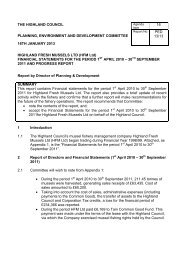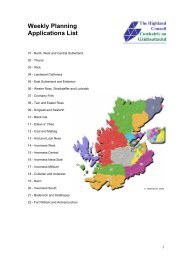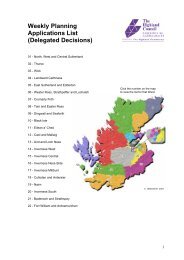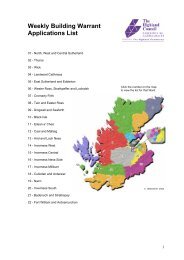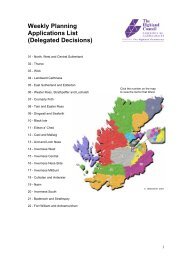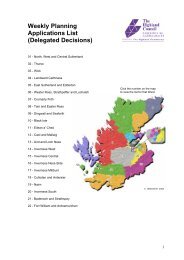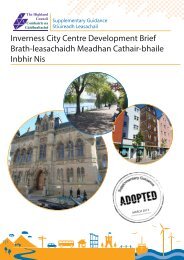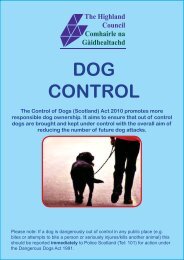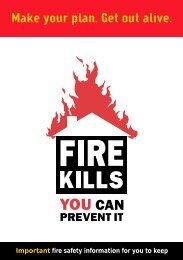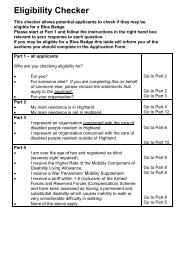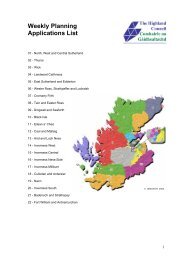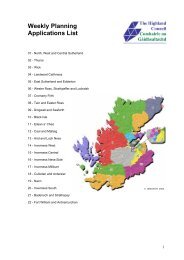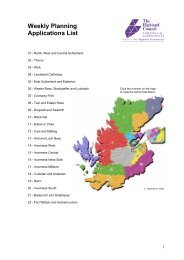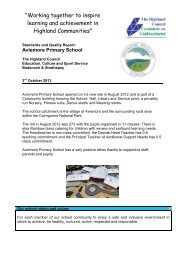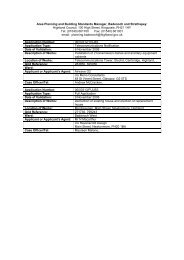A Single Strategy for Sensory Needs - The Highland Council
A Single Strategy for Sensory Needs - The Highland Council
A Single Strategy for Sensory Needs - The Highland Council
Create successful ePaper yourself
Turn your PDF publications into a flip-book with our unique Google optimized e-Paper software.
Deafblind Scotland<br />
Deafblind Scotland is committed to working in partnership with local authorities, including the <strong>Highland</strong> <strong>Council</strong>, to ensure that<br />
deafblind people in Scotland enjoy similar services as those in England and Wales. In this respect, Deafblind Scotland has<br />
provided a service across the <strong>Highland</strong>s, funded by <strong>Highland</strong> Health Board, during the past 2 years.<br />
Whilst many needs of people with dual sensory impairments can be met by single sensory impairment services, not all deafblind<br />
people can automatically access these services.<br />
Deafblind Scotland would wish to work with local agencies to implement a professional, discrete and dedicated guide/<br />
communicator service <strong>for</strong> deafblind people in the <strong>Highland</strong>s. In this way the specific needs of deafblind people may be more<br />
fully met. <strong>The</strong> good work already being undertaken by local agencies and services across <strong>Highland</strong> is acknowledged and<br />
Deafblind Scotland would wish to augment this work. It is also recognised that there are a number of routes to deafblindness<br />
and it is crucial that appropriate arrangements are put in place in order to facilitate the early identification and intervention<br />
required.<br />
It is however acknowledged that the policy of pro-actively closing relevant community care cases in <strong>Highland</strong> may militate<br />
against the identification of dual sensory impaired individuals, as many do not become significantly dually impaired until later in<br />
life.<br />
Deafblind Scotland believe that there is a pressing need to accurately identify the number of deafblind people in <strong>Highland</strong><br />
and suggest that an Identification Project, in keeping with those undertaken in other parts of Scotland, would be worth while<br />
and provide vital in<strong>for</strong>mation <strong>for</strong> strategic planning purposes. <strong>The</strong> prospect of an office-based presence in the <strong>Highland</strong>s<br />
would be welcomed by Deafblind Scotland as would be the opportunity to be involved in co-operative working in order that<br />
deafblind people can access the resources and expertise required.<br />
44<br />
<strong>Highland</strong> Society For Blind People<br />
Children’s Service<br />
This service seeks to meet the needs of children and young people with a significant visual impairment with in <strong>Highland</strong> <strong>Council</strong><br />
area. <strong>The</strong>re are two teachers on Deafblind training. This and other sensory training will be funded in future to meet needs. <strong>The</strong><br />
criteria regarding referral to the service, is that the children’s visual impairment affects their striving <strong>for</strong> independence and<br />
their development. <strong>The</strong> majority of referrals come from the paediatric ophthalmologist and children are now being identified<br />
at a very early stage. <strong>The</strong> population of visually impaired children is 120 and is sparsely spread throughout the whole of the<br />
<strong>Highland</strong> Region. 50% of the population of visually impaired children have other special needs like cerebral palsy, or learning<br />
difficulties. It is tremendously important there<strong>for</strong>e that good liaising and co-ordinated, shared assessments and reviews are<br />
structured into the system between professionals and parents.



